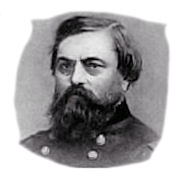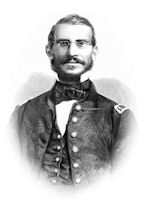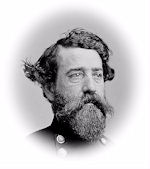—At Montgomery, Mr. Memminger presented a flag sent by some of the young ladies of South Carolina to the Convention.—(Doc. 35.)—National Intelligencer.
—The Congress at Montgomery this evening unanimously agreed to a constitution and provisional government. They will go into immediate operation.—(Doc. 33.)—No propositions for compromise or reconstruction. After the vote on the constitution was taken, Jefferson Davis was elected President, and Alexander H. Stevens Vice-President of the Southern Confederacy, by the Congress.—(Doc. 34.)—Commercial Advertiser.
—Brigs W. R. Kibby and Golden Lead; barks Adjuster and C. Colden Murray; and schooner Julia A. Hallock, all owned in New York, were seized in the harbor of Savannah, by order of the Governor of Georgia, in reprisal for the seizure, in New York, of arms consigned to Georgia.—Baltimore American.
—The Little Rock arsenal, Arkansas, with 9,000 stands of arms, 40 cannon, and a large amount of ammunition, was surrendered to the State of Arkansas.—N. Y. Times, Feb. 11.
FRIDAY 8
Mercury down to 8 this morning, the coldest so far. It is 18 tonight, but no snow on the ground. The wind last night was terrific. It did much damage. Quite a fire occured on 7th St. (Incendiary). Went down to the Ave, bot Paleys Philosophy for twenty five cts, the New York papers. Heard no particular news and came home, found our next door neighbor Mr Bartlett, he staid an hour or two. He is in the State Dept and a Virginian. Col. Hayne of S.C. (Commr) has got his reply from the Govt to his demand for surrender of Ft Sumpter. An attack on it is now Expected.
![]()
______
The three diary manuscript volumes, Washington during the Civil War: The Diary of Horatio Nelson Taft, 1861-1865, are available online at The Library of Congress.
FORT PICKENS, FLA., February –, 1861.
Hon. J. HOLT, Secretary of War:
SIR: I have to report that since my last letter per Captain Sands, U. S. Navy, matters have assumed no different form. I am continuing the defenses of the fort, and with my command will soon have it prepared to repel an attack. I have now seventy-eight guns mounted and ready for action. I will put up to-morrow three 10-inch light mortars. I have no others. The casemate embrasures are closed, some with brickwork and others with stone and pieces of wood. These will be strengthened as time permits. I am making canister for some of my barbette guns, there being none in the fort. An abatis of brush is being placed about the exposed points of attack. I have two 10-inch columbiads mounted, in order to render inefficient any battery which may be erected on the opposite side. There are two others in the fort which can be mounted if necessary. All work has been stopped on these batteries, according to the promise of Colonel Chase. I do not think there are more than four hundred State troops occupying the fort and barracks opposite. Fort McRee is occupied, but no guns mounted to my knowledge.
I am, sir, very respectfully, your most obedient servant.,
A. J. SLEMMER,
First Lieutenant, First Artillery, Commanding Post.

Anecdotes on the crisis: “I cannot return the goods, as you demand, for they are already sold, and the money invested in muskets to shoot you— Yankees!”—Letters of a Family During the War for the Union
Feb. 7, 1861.
Night before last a Virginia gentleman said to us: “Don’t be too sanguine. Union does not mean in Virginia what it means in New York. There it means only delay—it means Crittenden’s compromise; it means secession, not today but tomorrow.” The same gentleman said: “Floyd was no gentleman. No Virginia gentleman would ask him to dinner” (the climax of earthly honors I suppose) and that “he was intoxicated at the Richmond dinner and not responsible for his speech.” This Virginian said he would “stake his existence,” or something of the sort, on the honor of the South in paying, to the last cent, everything it owes the North. As an offset to this, Mr. Lockwood last night repeated to us the contents of three letters he had read yesterday, sent to acquaintances of his in answer to requests for payment. One said: “I shall pay, of course, every farthing I owe you, in cash, but not till I pay it in the currency of the Southern Confederacy.” Another sent a note to the effect: “I promise to pay, etc., five minutes after demand, to any Northern Abolitionist the same coin in which we paid John Brown, endorsed by thousands of true Southern hearts.” The third said: “I cannot return the goods, as you demand, for they are already sold, and the money invested in muskets to shoot you— Yankees!” Georgy was at a party last night at Amy Talbot’s, where nothing but politics was talked. Uncle Edward has just popped in, for a minute, and says: “All I am afraid of now is that Virginia and the other Border states will stay in; and we shall have the curse of their slavery on our shoulders without the blessings of a complete union.”
Dr. Roosevelt dined with us on Saturday, and I said: “What do you go for, Doctor?” “I go for gun-powder!” he answered. Mrs. Eliza Reed hears from her brother-in-law, a clergyman in Beaufort, S. C., that she “ought to be very thankful that her property is safely invested at the South” (partly in his own hands) and that he is “sorry he is not able to forward her the interest now due,” the fact being that she has not had a cent of her income this winter.
One more anecdote and then my gossip is over. Mrs. Dulany overheard two negresses talking on a corner in Baltimore. “Wait till the fourth of March,” said one of them, “ and then won’t I slap my missus’ face!”
![]()
THURSDAY 7
The morning was bright with a fine and cool atmosphere, just freezing, but tonight the wind blows almost a hurricane. I like almost any kind of weather better than a cold wind, consequently I have not gone out tonight. Nothing of importance has occured today. More U S troops have arrived and the idea of taking Washington will I think be abandoned by all who have been so disposed heretofore. Had letters today from Julia and from [S A Dewey or Ducey?]. Sent off ten copies of Agricultural Report of Pt office to friends in different States north. Rejected a case which Hon Schuyler Colfax M.C. has in charge. The “Peace Convention” promises good results.
![]()
______
The three diary manuscript volumes, Washington during the Civil War: The Diary of Horatio Nelson Taft, 1861-1865, are available online at The Library of Congress.

“Yesterday I landed at Fort Pickens, assumed command of the forces on the station, inspected the defenses, and had a consultation with Lieutenant Slemmer.”—Israel Vogdes.—Operations in Florida
PENSACOLA HARBOR, FLA., February 7, 1861.
Col. L. THOMAS, Assistant Adjutant-General, U. S. Army:
SIR: I have the honor to report that I arrived on this station yesterday in the U. S. steamer Brooklyn, with Company A, First Artillery. I met orders here which prevent the landing of my company or the re-enforcement of the garrison of Fort Pickens at present. Yesterday I landed at Fort Pickens, assumed command of the forces on the station, inspected the defenses, and had a consultation with Lieutenant Slemmer. I am compelled to remain on board the Brooklyn for the present, and can, of course, only give general instructions to Lieutenant Slemmer. I am sorry to inform the Department that I found Fort Pickens in a very inefficient state of defense. At the time Lieutenant Slemmer removed his command to Fort Pickens there were only forty guns mounted in the fort. At present there are fifty-four in position. The accompanying sketch indicates the position and class of guns now in position; total, fifty-four of all kinds.
Lieutenant Slemmer has with him only forty-six enlisted men for duty, and thirty ordinary seamen from the yard at this station, and the latter are entirely untrained, insubordinate, and of but little use in case of attack. There are fifty-seven embrasures that are unprovided with cannon, and are only about seven feet from the bottom of the ditch, and at present but few of them have only the common wooden shutter, presenting only a slight obstacle to an enemy. There are only very imperfect means of barricading them. Such as they are, however, I have given orders to be immediately employed.
Lieutenant Slemmer has been obliged to employ his command in getting guns into position and in barricading the embrasures. He is obliged to keep one-half of his men under arms every night, and they are nearly all exhausted with fatigue. The guns and carriages and implements are all old, and nearly unserviceable. I have made a requisition direct on the Department for the necessary supply of guns, carriages, and ammunition. The supply of this last is very inadequate. There is no ammunition for the columbiads, no cartridge bags for them, nor flannel to make any. In fact, had it been the intention of the Government to place the fort in the state to render its defense impossible, it could not have been done more efficiently than it has been done. The post is without any medical officer, and if it is intended to defend it there should be an Engineer officer sent at once to the station. I trust that the Department will immediately order that the supplies requested be sent. There are no bunks either for the hospital or for the troops, and but little bedding for the sick. I request a supply may be sent. There are plenty of provisions for the present, although I should like some desiccated vegetables and supplies for the officers. I would mention that all of the troops will be compelled to live in open casemates, and many of them will soon be on the sick-list.
The seceders have a considerable force in and about Pensacola; what number I am unable to say positively, but they are estimated at about 1,700 men. They are disorderly, and very unwilling to be controlled. Their leaders, from what I can learn, I believe are sincere in their intention to observe the armistice, but their ability to control the men under their command is very doubtful. They are engaged in erecting batteries, are making sand bags, &c. They have plenty of means of transporting their troops to Santa Rosa Island, and can attack the fort on all sides at once. At present there is not one trained man to a gun within the fort. Should the enemy decide to attack, it is exceedingly probable that he might succeed in penetrating into the fort before my company could be landed or any succor could arrive from the fleet. I should therefore urge upon the Department the necessity of the fleet taking up a position such as to prevent the landing of any forces within one and a half miles of the fort; this would give time to provide for the defense of the work and the landing of the troops from the fleet; otherwise we may have the mortification and disgrace of seeing the fort taken by a body of untrained troops under our very noses.
Should the armistice be broken, my company, all the marines, and as many sailors as may raise the garrison to four hundred men should be immediately landed. All of the advantages of the present armistice are entirely on the side of the seceders. I would therefore urge upon the Department the necessity of immediately re-enforcing the garrison. The two additional companies ordered to Forts Taylor and Jefferson are not immediately required for the defense of those works. In fact, in their present state, and with the forces now in them, they would be stronger than Fort Pickens will be when garrisoned with four hundred men. Captain Meigs kindly offered his services, if necessary, to assist in the defense of this place, and I request the Department that he may be ordered to repair to this place.
Lieutenant Slemmer has-done all that it has been possible to do with the small force under his command. His resolution to defend his post at all hazards evinces the highest moral courage on his part, but at the same time I must state that with any amount of vigor on the part of the assaulters his defense would have been hopeless. His resolution has probably been the means of preserving Fort Pickens from the seceders.
Yours, &c.,
I. VOGDES,
Captain, First Artillery.
![]()
P. S.–I must not be understood as recommending any violation of the existing armistice, but the collection of an amount of troops on the station as may be necessary for the defense should anything occur to rupture the present armistice.
FORT TAYLOR, KEY WEST, FLA.,……….
February 6, 1861.
SIR: Nothing has occurred at Key West since my last communication to disturb my relations with its citizens. It is very doubtful now if any attempt will be made upon this fort. I have transferred seven more 8-inch columbiads to Major Arnold, which will give him additional strength if ammunition is furnished him by the Ordnance Department. My powder is very bad; also friction tubes. A supply should be sent here immediately.
Very respectfully, your obedient servant,
J. M. BRANNAN, Captain, ……….
First Artillery, Commanding.
Lieut. Col. L. THOMAS,
……....Asst. Adjt. Gen., Headquarters Army, Washington City, D.C.
WEDNESDAY, FEBRUARY 6, 1861.
A pleasant day overhead but muddy under foot. Wm H [Burridge or Burniage?] of Cleveland Ohio dined with us today, Chas also. Public affairs look brighter than they did before the Virginia Election. The Peace convention now in Session here sit with closed doors, but as far as known everything with regard to it looks favorable to an adjustment. Had letter today from Brother C R. He will start for Washington 1st day of March. Did not go down to the Ave’e tonight. Willie was learning from me how to write his name and to add up figures. The other boys, Halsey & H N, are drawing.
![]()
______
The three diary manuscript volumes, Washington during the Civil War: The Diary of Horatio Nelson Taft, 1861-1865, are available online at The Library of Congress.
1861. February 6.—Parliament was opened yesterday by the Queen in person. The military parade, turnout of royal equipages, and assemblage of Peers, Peeresses, Bishops, and Judges, were unusually imposing. The speech was fuller and clearer than common. The paragraph devoted to the United States was uttered as if really felt, though I certainly did not do what some of the newspapers allege,—nod my head with an expression of misgiving as to a “satisfactory adjustment.”
“Serious differences have arisen among the States of the North American Union. It is impossible for me not to look with great concern upon any events which can affect the happiness and welfare of a people nearly allied to my subjects by descent, and closely connected with them by the most intimate and friendly relations. My heartfelt wish is that these differences may be susceptible of a satisfactory adjustment.
“The interest which I take in the well-being of the people of the United States cannot but be increased by the kind and cordial reception given by them to the Prince of Wales during his recent visit to the continent of America.”
Went to the Commons at eight o’clock, and witnessed the first scene of what I cannot but regard, for the existing government, as an inauspicious breach, on reform, between Lord John Russell and Mr. Bright. The motion was to amend the reply to the speech by a clause as to the omission of that topic. Forty-six, in a thin house, voted for it.







